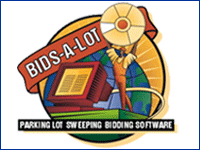
When it comes to running a sweeping company, including how you bid sweeping jobs, there's no right and wrong way to do it if you have the facts you need. What's important is that you work out a way that works -- and makes money -- for you.
That said, it's very important that you know your cost of operating your sweeper for an average hour's time. That's the foundation for deciding how much you're going to charge for running it for someone for an hour. Typically, when you run the numbers my ballpark prediction is you'll find you're at least at $20/hour for a single-engine parking lot sweeper and $4 or $5 above that in an hour of running a twin-engine machine. And, remember, that's just for the sweeper.
You have to know your cost of getting to and from a job, and to sweep it according to the specs of the contract, before you can begin the process of giving a price to a customer. I know what it's like to work with small margins because we run in excess of 30 sweeper trucks in the greater Detroit area, which is not a good economic climate to say the least. We're still doing okay only because we keep our costs under control.

First off, if someone has asphalt, then my opinion is that they need me. It doesn't matter what type of business or usage they have, if they have asphalt then they need it swept. Before I can start the process of giving someone a bid, though, I need to know more about the condition of the pavement. Does it have a good sealcoat; is it in overall good shape; are there places with potholes and broken up pavement? Those all affect how I can price.
Next, you need to know about what happens in that particular area of town: What's the clientele like, the people who frequent the lot, as well as what are the types of stores? Is this an area of town, or the type of stores, where everything gets thrown out instead of put into the garbage cans? For example, some grocery stores continually have sale flyers, and these are always being blown out of shopping carts and are on the ground or against the fence line and in the landscaping. Auto parts stores are also particularly prone to having debris strewn around.

Then, what's the perimeter and landscaping like? Are there chainlink fences, where debris that must be removed by hand will usually be blown against them? Can your employees use a backpack blower to remove debris from landscaping, or does it have wood chips or another covering where your people will have to handpick there, too?
Look at how many curblines are there where you'll need to handpick, or islands where you need to do the same? And, how about the sidewalks; can you blow them all off and how long will that take?
Will you be changing out the liners? Most centers want that service done, as well. When you change out liners there's more to it than the cost of the liners. There's not only the time to change them out, but you have to dispose of them properly, as well, which usually means transporting them to a dumpster somewhere. We figure 3 to 5 minutes to handle a garbage can.
Next, drive around the back of the center and make the same type of assessments in that area. Everything your operator has to do, especially when they're out of the sweeper, takes time. In essence, what you're trying to figure out is how much time, on average, is it going to take to do a good job of keeping any client property clean. If you can't get the account at a price where you can do a decent job and make a profit, in my opinion you can't afford to take the account. Remember: Your reputation is attached to every account you have.

Next let's discuss about where you'll be dumping the debris you pick up. Does the client have a dumpster(s) you can put their debris into or will you have to take the debris to a dumpster you rent and locate in various locations in your market area? If so, that's an additional cost that needs to be included in your pricing. How long will it take to offload debris, on average? What will that cost you, including upkeep on the dumpster(s), if owned by you?
Also be sure you take into account the seasonality of sweeping if that's a factor in your area of the country. In some areas the difference in time it takes to sweep in summer and winter can be vastly different. That's where something like a GPS or other tracking system can prove so valuable, since over time you're able to track the average time spent at each and every customer property.
What allocations should you be making between the variable costs of running your sweeper, which occur only when you sweep, and all your other overhead, from insurance to office expenses to employees and everything else that goes on no matter what? There is little you can do to affect the direct costs, once you have shopped for the best value for consumables. However, the overhead you can allocate among departments, to further refine your cost structure.
For example, you might allocate to different departments by employee. Only by determining all the costs of a given department in your company can you come up with the unit cost per each part of your company. That's much better than working with just an overall overhead figure. The further down you can break any of your costing, the more accurate you can be in any given situation or on any bid.
Once you know all of your costs, then you know the cost of doing business for your company. You should know, by breaking the various items down into variable and fixed costs, what it costs you to both run your sweeper(s) and what it costs you when they sit and the payments and other fixed expenses continue. From there, you need to put a figure for profit onto your costs and that's what you bid.
Another aspect to consider is the location of a prospective customer. Let's say a potential new customer is located a half hour from your shop, but right next to an existing customer. When you bid, do you allocate any driving time to them? Most contractors would say you need to do that, because you never know when you'll lose the customer that's now next door. This is especially true if that's the only other customer you have in that nearby area.
For example, I know that Uri [Ben Yashar, of East Coast Lot and Pavement Maintenance, the leader of the overall seminar where this portion was featured], breaks his driving time down into three different regions: local, mid-range and long-range. Each is given a different percentage of add-on amount that's attached to a given bid, depending upon how far away from his shop the new client is located. This percentage is added to the base cost that would have been charged out to the job if it happened to be located next to his shop.
For example, when Uri bids a new client that's in the 'long-range' classification, he adds the cost of driving both ways on to the cost figure he would otherwise use. That is his total cost of doing work for that client; from there, a profit margin must still be added on in order to be profitable.
In every industry the companies in it must come up with a unit of measure for bidding. In this industry, most contractors use the unit of time, rather than square footage or some other measurement. When everything is broken down into the time it takes, and you know what your time costs you per minute, for example, you can then bid with confidence.
Here's a side note when we're talking about costs: I recommend to everyone that they do whatever they can think of to control the costs of everything they do in business. This includes everything, whether it's employee-related, service-related, buying garbage bags, the cost of sweeper consumables or anything else.
Using Uri once again as an example, he told us one time that he has three vendors who each bid weekly on providing him with the fuel he uses. The low bidder delivers his fuel the following week. That's an example of the extent one very successful contractor evaluates what everything does costs him.
I've been sweeping for 27 years and I have about 60 employees. Even if you are running a one- or two-sweeper company, I predict you'll be absolutely shocked at how much anything and everything in your business costs if you track it well. Fortunately, if you do track everything and then include the information in your pricing to customers, you'll be turning a profit on every service you perform.
|
